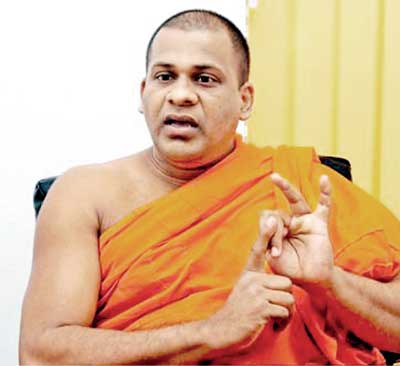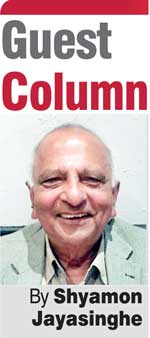Monday Feb 16, 2026
Monday Feb 16, 2026
Saturday, 24 June 2017 00:00 - - {{hitsCtrl.values.hits}}
“I think that hate is a feeling that can only exist where there is no understanding” – Tennessee Williams, Sweet Bird of Youth
A few days ago we had the Ven. Warakagoda Shri Gnanarathana, Mahanayake of the Asgiriya Chapter of the Siam Nikaya, admonishing the Government over attempts to bring the monk Gnanasara before the Court. Apparently he was issuing a media release from the Executive Committee of the order. The statement carries more confusion than enlightenment, more arousal than the dousing of flames. I really don’t know why the Venerable Mahanayake chose to make a statement of this nature. I don’t know why he didn’t hold out the lamp of the Dhamma in a moment of crisis.
The Court charge 
For one thing, with regard to this issue the Government has not done anything that a Government should not be doing. Sri Lanka had only one person constitutionally recognised as above the rule of law and that was the President. After the 19th Amendment that is mercifully no more. Similarly, the monk Gnanasara cannot be allowed to muck around and mug around as a law unto himself. He, like the clergy of all other faiths, must face the law if he is charged with legally offensive behaviour.
Gnanasara has one charge pending in Court and that is serious. He went into hiding, evading arrest, which is also both unethical and illegal. He was ordered to be arrested by the Magistrate of an independent Judiciary, not by any politician in the Government. He had entered a Magistrate’s Court and (reportedly) verbally abused and threatened a woman who had appeared to defend her lost husband over a Habeas Corpus application. The husband was famed journalist, Ekneliyagoda, who had gone missing like many other journos under the regime of the Rajapaksas. It was all legitimate business and Gnanasara was allegedly acting in contempt of court. Nobody in a civilised and law-abiding social order can be permitted to obstruct Court and threaten people.
What offends our ethical sense is that in this particular case, it was a woman grieving for her husband. Leave alone the law, where was the monk’s Metta, Karuna, Upeksha and Upadana? Aren’t these the four noble values or Brahma Viharas that the Buddha wanted his followers to practise? Didn’t Gnanasara realise he was trampling on a vulnerable and grieving woman?
Another question: What was Gnanasara’s business in invading the court on a matter like this? Was he acting as an agent of political forces responsible for the dastardly treatment of Ekneliyagoda? There was no Muslim involvement here at all. Then how come he went there?
A false man in a false robe
This incident demonstrated how Gnanasara had more than an anti-Muslim agenda in mind. He is in someone’s political camp. In fact, Gnanasara began his lawless career by attacking a Christian Church. He had switched over to anti-Muslim slogans later.
In this day and age of Islamic fundamentalism that was a more effective platform for a disruption campaign as it is likely to derive more public support. Gnanasara, to my mind, is a false man wearing a mask and in a robe that is false, a plain politician’s agent provocateur.
How come then that our Venerable Mahanayake defends Gnanasara the way he does? The Asgiriya and Malwatte Chapters have historically been pushed by influential persons and forces to make outlandish statements for public consumption. I remember how during post-Independence General Elections our Mahanayakes had invoked the electorate to support particular parties. I thought the Chapters had since been reformed. Not after this latest outburst.

The Gnanasara method
Gnanasara is heading to face another charge and this time President Sirisena wanted police to arrest him and bring him to court. That was over allegations that he and his BBS outfit of goons had been going on a rampage burning mosques, Muslim shops and obstructing the police. The police that intervened to bring in order are said to have been abused in raw filth by the monk.
I don’t know why our Venerable Mahanayake did not find this alleged behaviour an extreme violation of the Vinaya Pitaka. Besides, it had been an open transgression of the need for basic civility that one should expect from any citizen, leave alone a member of the Sangha order. One doesn’t find Christian priests behaving like this.
True, the Mahanayake did state that they disagreed with the way Gnanasara got about his ‘mission’. Should they have not said something more emphatic in the context than this mild disapproval? I don’t know why the Mahanayake did not express disgust and contempt over acts of intimidating, uttering filth, making incendiary speeches and instigating goons to burn the property of others.
There are videos available that went viral that showed Gnanasara in action during his infamous Battle of Aluthgama. Surely someone would have brought all this to the Venerable Mahanayake’s attention? Surely the Venerable Mahanayake should have investigated all this before issuing a statement? I don’t know why he went soft.
The message of the monk
What else does the statement from the Mahanayake pulpit say? It supports the ‘message’ of Gnanasara although not the method. The ends and not the means. This is consequentialist ethics, someone would say. But then what really is the ‘end’? It isn’t clear at all. I can only think of it as an attempt to restrain Muslim ‘expansion’.
I am not denying one bit that there is provocation from some Muslim quarters. Unfortunately again the damage comes from leadership. The rank and file of Muslims in Sri Lankan villages live in close harmony among the Sinhalese. They speak and write fluently in Sinhala and they trade with the Sinhalese, adding their might to the GDP and helping to trigger economic activity. It is wrong to tar brush the entire Muslim community for isolated acts of a few bad ones inasmuch as it is wrong to tar brush Buddhists because of the miserable Gnanasara. The Muslim fundamentalism we see in Middle East countries is not observed in our island, and we are merciful for that. Muslims do not go round trying to convert Sinhalese Buddhists and they do not throw stones at Buddhist temples. Therefore, it is hard to acknowledge the veracity of Gnanasara’s message. I don’t know why the Mahanayake gave a holy sanction for that.
The Buddha did emphasise the need for both the ends and means to be wholesome. Ahimsa was his noble method. Ahimsa does not mean avoiding resistance to the undesirable action of enemies. It was, as demonstrated by Gandhi, a most effective strategy of positive resistance.
Mahatma Gandhi drove the whole British Empire away from Indian soil by the method of Ahimsa. Basically it is resistance via civility and kindness. The Buddha wasn’t preaching in the air, he wasn’t being impractical. He explained how effective this method is. I don’t know why when a challenge is thrown we do not apply this Buddhist teaching of civil resistance? I don’t know why the Venerable Mahanayake did not take this path. Preaching must be tested in the face of practical challenge. If not, preaching is useless.
In other words, the Mahanayake seems to suggest that the teaching must be abandoned when it comes to the need for application. I don’t know why. Of what value is a teaching if it cannot be applied?
If Gnanasara and his BBS goons are treated mildly and even encouraged in this way by the highest prelates of the island, Sri Lanka is heading for serious self-destruction. We are going to be a Syria or an Iraq. Muslim militancy would be far worse and catastrophic than the Tamil militancy we have gone through for 26 years. Sri Lanka will be in flames and the life of ordinary people will be in ruins. I don’t know why the Venerable Mahanayake does not realise this practical fact.
Civility solution and its biological roots
Most societies in the world are complex ones today. Relative homogeneity as we observe in countries like Japan, China and Korea is rare. Sri Lanka is a pluralistic society with several ethnicities and religions holding sway. This is our lot and we have to face that reality, like it or not. In a situation like this periodic eruptions and conflicts are bound to arise among the diverse groups. We must be tuned to cope with such unfortunate breakdowns. Religious and ethnic leaders must take responsibility for this and our education system and media must be oriented to develop coping programs.
The only workable and pragmatic way to cope with diversity is to opt for what is known as the civility solution. This is just the opposite of what Gnanasara is doing. Religious and lay leaders must act responsibly to deal with transgressions in a civil manner. Civility does not mean mere politeness like saying, ‘excuse me’ or ‘please’. It is much broader and deeper than that.
Firstly it must derive from an understanding of the inevitability of conflict. This is ‘Pragna’ in Buddhism. Secondly, we must develop a compassionate approach based on the above understanding, empathy. This is ‘Karuna’ in Buddhism. Thirdly, we must segregate the people from the event involved and treat this with neutrality. This is ‘Upekka’ in Buddhism. Fourthly, enveloping all these, is that we must learn to be naturally friendly with others. This is ‘Metta’ in Buddhism.
So there you are. Buddhism already has the civility solution. I don’t know why our Venerable Mahanayake could not see this and reach out to contending factions with the light of the lamp of the Dhamma.
We must adopt the civility solution not merely because there isn’t any other available path if we are to keep our complex society together nor because we are told to do so by the Dhamma or the Mahanayake (hopefully). There is an interesting biological reason why civility and kindness has a chance of success in negotiating ‘the other’ in complex societies. Prof. Pier M. Forni in his bestselling book ‘The Civility Solution: What do we do when people are rude. (Chris Hartlove)’ makes the point clear. He explains how if you pet a dog, the dog’s neurons transmit a cascade of pleasing neurochemicals that help strengthen its immune system. But more remarkable, he pointed out, is that petting a dog elicits the same salubrious cascade in your brain. He cites studies showing that, more generally, volunteer work can induce a feeling some have termed the ‘helper’s high’—like the ‘runner’s high’ a period of elation followed by tranquillity.
(The writer can be reached via [email protected].)